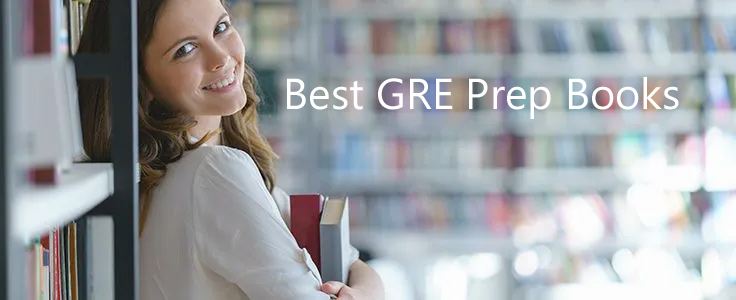Educational Psychology Books
From studying educational environments to cognitive development, educational psychology looks at many facets of the educational system.
psychology, science or study of the thought processes and behavior of humans and other animals in their interaction with the environment. Psychologists study processes of sense perception, thinking, learning, cognition, emotions and motivations, personality, abnormal behavior, interactions between individuals, and interactions with the environment.
Educational psychology studies the behavior and cognitive processes linked to educational settings. The studies researchers have carried out in this area provide us with strategies and tools that can help us create an ideal educational system. Despite being a little-known discipline in mainstream society, it has great potential. We can learn about this potential by reading the best books on educational psychology.
Many theorists have contributed to this branch of psychology. The books we talk about in this article are written within a common framework based on social constructivism. This theoretical perspective is important because it helps us understand education from its broadest points.
If you are interested in the latest information on educational psychology,check out these 20 great books that cover a wide range of teaching and learning concepts.

1.Educational Psychology (13th Edition)
Author: Anita. Woolfolk And Vij Shivani
Publisher: Pearson India; 13th edition (June 30, 2017)
Please Read Notes: Brand New, International Softcover Edition, Printed in black and white pages, minor self wear on the cover or pages, Sale restriction may be printed on the book, but Book name, contents, and author are exactly same as Hardcover Edition. Fast delivery through DHL/FedEx express.

2.How the Brain Learns
Publisher: Corwin; Fifth edition (December 2, 2016)
Educational neuroscience consultant David A. Sousa continues his tradition of translating new findings into effective classroom strategies and activities in this updated version of his bestselling text. This fifth edition integrates recent developments in neuroscience, education, and psychology and includes
- New information on memory systems, especially working memory capacity
- Updated research on how the explosion of technology is affecting the brain
- Current findings on brain organization and hemispheric specialization
- New evidence on how learning the arts enhances cognitive processing and creativity
- An expanded resources section
- More than 150 new or updated references
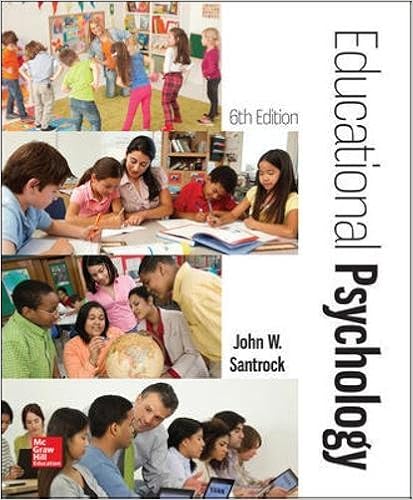
3.Educational Psychology 6th Edition
Author: John Santrock
Publisher: McGraw-Hill Education; 6 edition (March 21, 2017)
Santrock’s Educational Psychology emphasizes the application of theory to real classroom practice. With richly evocative classroom vignettes from practicing teachers and a wealth of case studies, Educational Psychology helps students think critically about the research basis for best practices. Santrock’s hallmark Learning System organizes the content into manageable chunks under learning goals, supporting retention and mastery, so that students will have an engaging and successful course experience. The Connect course for this offering includes SmartBook, an adaptive reading and study experience which guides students to master, recall, and apply key concepts while providing automatically-graded assessments.

4.Educational Psychology: Developing Learners plus MyLab Education with Pearson eText -- Access Card Package (10th Edition)
Author: Jeanne Ellis Ormrod (Author), Eric M. Anderman (Author), Lynley H. Anderman (Author)
Publisher: Pearson; 10 edition (January 12, 2019)
If purchasing or renting from companies other than Pearson, the access codes for the MyLab or Mastering platform may not be included, may be incorrect, or may be previously redeemed. Check with the seller before completing your purchase.
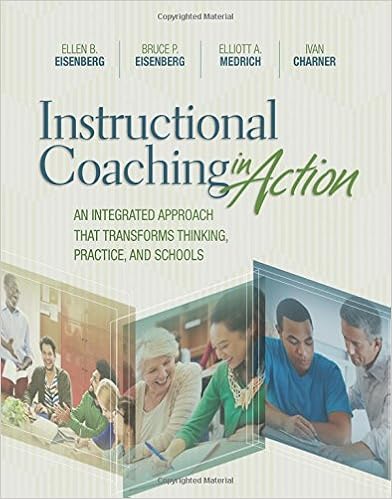
5.Instructional Coaching in Action: An Integrated Approach That Transforms Thinking, Practice, and Schools
Author: Ellen B. Eisenberg (Author), Bruce P. Eisenberg (Author), Elliott A. Medrich (Author), Ivan Charner (Author)
Publisher: ASCD (May 22, 2017)
Unlike "fix-it" strategies that targeted teachers are likely to resist, educator-centered instructional coaching—ECIC—offers respectful coaching for professionals within their schoolwide community. Evidence-based results across all content areas, authentic practices for data collection and analysis, along with nonevaluative, confidential collaboration offer a productive and promising path to teacher development. Coaches and teachers implement ECIC through a before-during-after—BDA—cycle that includes comprehensive planning between coach and teacher; classroom visitation and data collection; and debriefing and reflection.

6.Educational Psychology: Theory and Practice (12th Edition)
Author: Robert E. Slavin
Publisher: Pearson; 12 edition (March 15, 2018)
Educational Psychology: Theory and Practice offers complete, up-to-date information that is presented in readable, practical ways and illustrated with engaging examples and case studies. Embedded videos and interactive activities in the Enhanced Pearson eText in MyLab Education further illustrate key concepts and facilitate application. The text makes the connection between theory and practice explicit, helping students transfer what they learn to their own teaching. The Twelfth Edition reflects ongoing changes in our learning sciences that continue to transform educational psychology and teaching, incorporating new research and practical applications of many contemporary topics.

7.Educational Psychology (12th Edition)
Author: Anita Woolfolk
Publisher: Pearson; 12 edition (January 15, 2012)
The 12th Edition of Educational Psychology maintains the lucid writing style for which the author is renowned. It is as free of jargon and technical language as possible in order to be clear, relevant, and interesting to all readers. Theory and practice are not separated in the text, but are considered together. The book shows very clearly how information and ideas drawn from research in educational psychology can be applied to solve the everyday problems of teaching. Readers explore the connections between research and practice through a wealth of examples, lesson segments, case studies, guidelines, and practical tips from experienced teachers. The content reveals the immense value and usefulness of educational psychology, a field that offers unique and crucial knowledge to any who dare to teach and to all who love to learn.

8.CLEP® Introductory Psychology Book + Online (CLEP Test Preparation)
Author: Don J. Sharpsteen Ph.D.
Publisher: Research & Education Association; Second Edition, Revised edition (February 16, 2012)
CLEP® is the most popular credit-by-examination program in the country, accepted by more than 2,900 colleges and universities. For over 15 years, REA has helped students pass the CLEP® exam and earn college credit while reducing their tuition costs.
Our CLEP® test preps are perfect for adults returning to college (or attending for the first time), military service members, high-school graduates looking to earn college credit, or home-schooled students with knowledge that can translate into college credit.
There are many different ways to prepare for the CLEP® exam. What's best for you depends on how much time you have to study and how comfortable you are with the subject matter. Our test prep for CLEP® Introductory Psychology and the free online tools that come with it, will allow you to create a personalized CLEP® study plan that can be customized to fit you: your schedule, your learning style, and your current level of knowledge.

9.Applying Educational Psychology in Coaching Athletes
Author: Jeffrey J. Huber
Publisher: Human Kinetics, Inc.; First edition (September 18, 2012)
A three-time U.S. Olympic coach and veteran collegiate coach, Huber infuses his own experience in applying theories of educational psychology in working with individual athletes, as well as world-class national and international teams. With an engaging presentation and strong practical applications, Huber assists coaching students and practicing coaches in utilizing educational psychology as a platform for improving coaching skills.
Applying Educational Psychology in Coaching Athletes introduces the idea of the developing coach as both teacher and learner, and how coaching principles and a strong coaching philosophy provide a foundation for effective management and decision-making. By considering the theories that drive successful coaching, developing coaches gain focus, motivation, and guidance as they learn how a thoughtful coach provides the structure and discipline to make athletes more successful on the field of play.
Throughout the text, Huber focuses on how athletes learn, considering theories of motivation, behaviorism, cognition, and humanism, and the interplay between emotions and motor learning and performance. Each chapter opens with a coaching related anecdote that readers can relate to in order to highlight the significance of the theory under consideration. After careful explanation of each theory, Huber details concrete examples, guidelines, and specific applications for coaching. In addition to summary information, each chapter concludes with ‘Your Coaching Toolbox,’ which focuses readers on ways to incorporate their newly gained knowledge into their interactions with athletes.
Applying Educational Psychology in Coaching Athletes is unmatched in its depth of insight into the teaching and learning process in sport and how to put it into practice. By examining how athletes learn and coaches teach, the text helps coaches understand how to maximize athlete performance and increase their athletic success.

10.Educational Psychology with Virtual Psychology Labs
Author: Bruce W. Tuckman (Author), David M. Monetti (Author)
Publisher: Wadsworth Publishing; 1 edition (January 1, 2012)
This comprehensive educational psychology book blends a strong scholarly and theoretical background with the application of theories and concepts using real-world examples, case studies, and practical teaching strategies. The text's innovative pedagogical program is anchored by a cohesive learning objective system integrated throughout each chapter, guiding your reading and reinforcing your understanding of concepts. This edition includes access to the book's website, Education CourseMate, where you can participate in Virtual Psychology Labs. Introduced in the text, the labs illuminate key experiments that are not easily explained in a book or demonstrated in the classroom. These first-hand research experiences allow you to gain a better understanding of the experiments' methodologies, conclusions, and implications. TeachSource Video Cases, introduced in the text and available at CourseMate, allow you to view real-life classroom scenarios that demonstrate teaching applications and best practices. Among other distinctive aspects of the text are an entire chapter on group process and a unique "Think It Over" feature that asks you to reflect on important topics as both a student of psychology and a future classroom teacher.
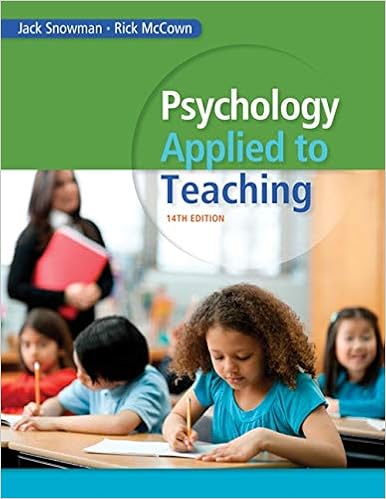
11.Psychology Applied to Teaching
Author: Jack Snowman (Author), Rick McCown (Author)
Publisher: Cengage Learning; 14 edition (February 24, 2014)
This book has received wide acclaim for its practical and reader-friendly approach to educational psychology, which demonstrates how complex psychological theories apply to the everyday experiences of in-service teachers. Coverage of educational psychology is framed so that aspiring or developing teachers can see themselves as professionals who continuously seek, find, and test better ways to help their students succeed. PSYCHOLOGY APPLIED TO TEACHING, 14th Edition, combines fresh concepts and contemporary research with long-standing theory and applications to create a book that addresses the needs of today's teachers and students. This edition also features integration of InTASC Standards, new Learning Objectives correlated with chapter headings and summaries, new Guides to Reading and Studying, new first-person accounts (Improving Practice through Inquiry: One Teacher's Story), and more.

12.Educational Psychology plus MyLab Education with Pearson eText -- Access Card Package (14th Edition)
Author: Anita Woolfolk
Publisher: Pearson; 14 edition (January 14, 2018)
Used books, rentals, and purchases made outside of Pearson
If purchasing or renting from companies other than Pearson, the access codes for the MyLab platform may not be included, may be incorrect, or may be previously redeemed. Check with the seller before completing your purchase.
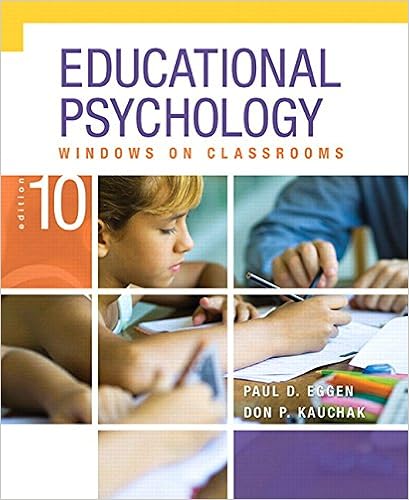
13.Educational Psychology: Windows on Classrooms, Enhanced Pearson eText with Loose-Leaf Version
Author: Paul Eggen (Author), Don Kauchak (Author)
Publisher: Pearson; 10 edition (January 6, 2015)
Case-based, balanced, and applied, this significantly revised Tenth Edition focuses on applying theories and research in educational psychology to an educator’s work in the classroom. The content has been updated to reflect the most current research and trends in the field and in K-12 classrooms, yet care has been taken to preserve the essential applied nature of this text. Using an integrated-case approach, authors Eggen and Kauchak begin each chapter with a case study taken from actual classroom practice, and then weave the case throughout the chapter, extracting specific illustrations and, in some instances, using dialogue directly from the case to emphasize the application of chapter content to the classroom setting. Many additional concrete examples taken from both classrooms and daily living further illustrate the content of each chapter in a comprehensive and approachable manner. The Enhanced Pearson eText features embedded video and assessments.

14.Educational Psychology: Reflection for Action
Author: Angela M. O'Donnell (Author), Johnmarshall Reeve (Author), Jeffrey K. Smith (Author)
Publisher: John Wiley & Sons; 3rd edition (December 6, 2011)
Teachers help students learn, develop, and realize their potential. To become successful in their craft, teachers need to learn how to establish high-quality relationships with their students, and they need to learn how to implement instructional strategies that promote students' learning, development, and potential. To prepare pre-service teachers for the profession, the study of educational psychology can help them to better understand their students and better understand their process of teaching. Such is the twofold purpose of Educational Psychology – to help pre-service teachers understand their future students better and to help them understand all aspects of the teaching-learning situation. The pursuit of these two purposes leads to the ultimate goal of this text – namely, to help pre-service teachers become increasingly able to promote student learning, development, and potential when it becomes their turn to step into the classroom and take full-time responsibility for their own classes.

15.The Whole-Brain Child: 12 Revolutionary Strategies to Nurture Your Child's Developing Mind
Author: Daniel J. Siegel (Author), Tina Payne Bryson (Author)
Publisher: Delacorte Press; 1 edition (October 4, 2011)
In this pioneering, practical book, Daniel J. Siegel, neuropsychiatrist and author of the bestselling Mindsight, and parenting expert Tina Payne Bryson offer a revolutionary approach to child rearing with twelve key strategies that foster healthy brain development, leading to calmer, happier children. The authors explain—and make accessible—the new science of how a child’s brain is wired and how it matures. The “upstairs brain,” which makes decisions and balances emotions, is under construction until the mid-twenties. And especially in young children, the right brain and its emotions tend to rule over the logic of the left brain. No wonder kids throw tantrums, fight, or sulk in silence. By applying these discoveries to everyday parenting, you can turn any outburst, argument, or fear into a chance to integrate your child’s brain and foster vital growth.
Complete with age-appropriate strategies for dealing with day-to-day struggles and illustrations that will help you explain these concepts to your child, The Whole-Brain Child shows you how to cultivate healthy emotional and intellectual development so that your children can lead balanced, meaningful, and connected lives.

16.Educational Psychology: Developing Learners with MyLab Education with Enhanced Pearson eText, Loose-Leaf Version
Author: Jeanne Ellis Ormrod (Author), Eric M. Anderman (Author), Lynley H. Anderman (Author)
Publisher: Pearson; 9 edition (January 16, 2016)
Used books, rentals, and purchases made outside of Pearson
If purchasing or renting from companies other than Pearson, the access codes for Pearson's MyLab & Mastering products may not be included, may be incorrect, or may be previously redeemed. Check with the seller before completing your purchase.

17.Educational Psychology
Author: JOHNNY CH LOK
Publisher: Independently published (July 18, 2019)
I shall explain the reasons why government's tuition fee educational subsidies program to university students which can influen them to raise interest to learnn in their university learning stage as below:Behavioral economic in educational subsidies program can be used to influence a number of existing education tuition need services and provisions to help to improve the efficacy of financial education to the feeling education financial sifficlut university students. For example, it cna better incorporated within the design of different educational financial courses to lend to the difficult university's financil subsidies assistance need students, in order to improve of education service and relevant education products to any universities, increasing students number to the school or raising student individual different courses or subjects choices of studying or learning behavioral change flooing education and incentivise commitment and sustained interest to learning behvior to the financial subsidiaries assistance studens. Thus, financial education of government's education subsidiaries assistance to university students plan which is only one of the relevant approaches that can be taken to help people to avoid of unwanted psychological traits, when they lack enough money to choose the most suitable univeristy to enrol. So, they only choose to study the another cheaper tuition fee schools to enrol them to study, if their government had not education tuition installment payment assistance subsidies program to lend to them to pay immediatly. Thus, to choose the most suitable univeristy to study. All of these education tuition fee sudsidy which can influence them often to go to the school in order to attend any lessons to listen their teachers' teaching courses attentively in classrooms. Why do they have interest to go to all lessons to listen their teachers' teaching courses persuasively? Because their attractive learning behaviors are influenced or encouraged or excited by government's education tuition subsidiary assistance program. They do not expect to fail to pass any one of subjects in order to pay extra higher educational tuition fee subsidy to their government later. Behavioral economics and economic psychology can help to explain the shortcomings of traditional approaches to financial education. But more importantly, they can be employed in the design of more effective educational programmes. Education product course design and delivery can also be improved by applying the lessons of behavioral economics. Behavioral economic assumes that students will respond to certain situations , such as lacking enough money to pay tuition fee to study the most right choice university or incentives in predictable ways, such as government supports financial education sudsidy to the feeling financial difficulties' university students.

18.Educational and Developmental Psychology: A Strategic Approach
Author: Daphne Hopkins
Publisher: CLANRYE INTERNATIONAL (May 16, 2018)
The branch of psychology which studies the behavior of an individual and the process of human learning is known as educational psychology. This field studies the cognitive as well as behavioral aspects of learning such as intelligence, motivation, etc. It includes theories such as functionalism, constructivism, Gestalt psychology, operant conditioning and information processing. This book unfolds the innovative aspects of educational and development psychology which will be crucial for the progress of this field in the future. With state-of-the-art inputs by acclaimed experts of this field, this book targets students and professionals alike.

19.Using Educational Psychology in Teaching (11th Edition)
Author: Paul Eggen (Author), Don Kauchak (Author)
Publisher: Pearson; 11 edition (January 11, 2019)
Using Educational Psychology in Teaching, 11th Edition, helps readers learn to apply educational psychology theories and research to their own classroom practice. This book teaches using an integrated-case approach — every chapter begins with a true-life classroom case study. The case is then woven throughout the chapter, highlighting practical ways the chapter content can be applied in real classrooms. Additional examples expand on the chapter content and provide concrete teaching strategies and suggestions for classroom practice. Updated to reflect the most current research and trends in K-12 classrooms, the 11th Edition introduces readers to the field of educational psychology in a comprehensive and approachable manner.

20.Essentials of Educational Psychology: Big Ideas To Guide Effective Teaching (5th Edition)
Author: Jeanne Ellis Ormrod (Author), Brett Jones (Author)
Publisher:Pearson; 5 edition (March 11, 2018)
While generally shorter than competing educational psychology textbooks, Essentials of Educational Psychology still provides a comprehensive overview of theories, research, and educational implications related to learning and cognition, motivation, child and adolescent development, instructional methods, classroom management, and assessment. Each chapter is organized around three to six Big Ideas, and each Big Idea is then divided into several more specific bold-faced principles or recommendations. Widely acclaimed for its conversational writing style, the book provides readers with a clear and easily understood picture of the psychological principles that impact teaching and learning.




